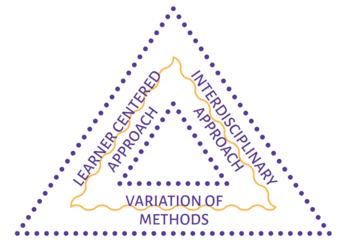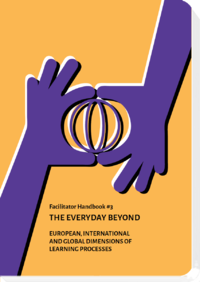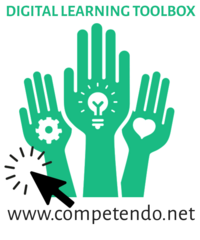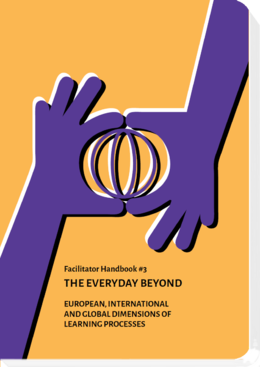A Cross-cutting Issue in a More Global World
Objects, ideas, people from “beyond everyday,” from beyond our city, region or even state contribute and shape our daily lives and our opportunities. As global humans, we talk about global issues with our friends and families, and as facilitators, teachers and trainers to children, youth or adult learners. Hardly any of the issues we work on can be fully understood without addressing the global connections behind them.
Global Learning is concerned with the connections between regions, cultures, and people across geographic boundaries. In a globalized world and under the sign of developments that encompass the world, such as digitalisation, climate change or economic globalization, it is increasingly becoming a transversal topic. Global Citizenship Education aims to merge the approaches of Education for Democratic Citizenship/Human Rights Education with Global Learning.
What is Global Learning?
The following two common definitions of Global Learning are often quoted and stated in the Maastricht Global Education Declaration, which was adopted in 2002:
- Global Education is education that opens people’s eyes and minds to the realities of the globalized world and awakens them to bring about a world of greater justice, equity and Human Rights for all.
- Global Education is understood to encompass Development Education, Human Rights Education, Education for Sustainability, Education for Peace and Conflict Prevention and Intercultural Education; being the global dimension of Education for Citizenship.
The world as one whole – Global Learning topics
Global Learning is not primarily about problems far away in the so called “Third World”. Global Learning deals in particular with questions of the roles we all play in a globalized and changing world that is characterised by diversity. In this context it is essential to acknowledge that our world-view is bound to our culture and has its own peculiarities and we need to encounter others’ world-views respectfully and with curiosity. Additionally, it is critical to recognise changing perspectives and diverse views as a learning principle. For example, we should look at our lives in relation to the global world and realise how our lives may be connected with people and societies of the Global South.
Making the world comprehensible: Methods in Global Learning
Creating educational processes and methodological material in a reflective way plays an important role within the field of Global Learning. The following cornerstones are essential:
- learner centered approach
- variation of methods
- interdisciplinary approach
The starting point for the learning process is the learner’s environment, experience, and interests. Global Learning should be designed to give learners the opportunity to reflect on their own values and points of views, including prejudices and stereotypes. It should create an atmosphere where complex situations such as contradictions and feelings of disorientation are allowed and considered. In addition, it should help learners to improve their skills in dealing with these problematic issues.
Using a variety of methods and shifting between them is particularly important in the field of Global Learning. This addresses people with different learning styles and includes various types of learning. The choice of methods should be based on the learning contents, with the main emphasis on social and interactive learning.
An interdisciplinary and interconnected approach is central to Global Learning. This is an important challenge to meet, especially in formal education.
The Global Learning environment and approach
The Global Learning approach focuses on learning as an ongoing process, which cannot be narrowed down to content or predetermined learning and teaching roles. Interacting with others can imply changing roles. Being conscious of the fact that everyone is a learner and an educator is a fruitful approach which puts everyone on an equal footing.
Global Learning contents and methods, as well as the learners’ needs, require flexible management of time and space. This is why Global Learning should not be limited by fixed timetables, room schedules, and seating plans. Since Global Learning addresses sensitive issues like racism and forced migration, it is of particular importance to create an atmosphere where all participants are at ease, where free expression is welcome, and where conflicts and different opinions are discussed with respect. It is respect that makes it possible to live together and that enables us to take responsibility for the way we live our lives. At times, being empathetic can be quite challenging, but only when we confront ourselves with different viewpoints are we able to develop critical ways of thinking.
During this process, different positions are reflected, new ones are considered, and conflicting views are confronted. The focus is not on achieving a result which is satisfying for everyone, because it is not about levelling opinions and views. What is more important here is to respect and consider different opinions. As every person has different interests, their differing needs can lead to conflicts at a global as well as local level. That is why it is important to allow conflicts in the learning environment to happen in safe surroundings, so to speak. Conflicts will always exist and Global Learning should not be in an ivory tower separated from this phenomenon. Instead, a respectful solution-focused approach to conflicts should be encouraged.
Our long-term experience has shown that children, young people, and adult learners respond positively to these methodological approaches within a respectful atmosphere. The learner-centred approach, which conveys the feeling of being taken seriously, is crucial in this context.
Perspective
- Global Learning does not teach specific contents or points of view.
- Global Learning enables learners to approach themselves and their environment in our globalization world with an open, critical mind and to form their own opinion and actively advocate for their point of view. Knowledge of global issues and respect for other people and our environment form the framework of the content and ideology of Global Learning.
- Global Learning does not provide the answers to all the questions of our time but offers the potential for supporting learners to become conscious global citizens who question the world and are committed to their ideals.
Global Citizenship Education
The approach connecting active citizenship with global learning.
Franz Halbartschlager
Lead of the Educational Department of Südwind (AT) and expert for global learning. PhD of Philosophy (University Vienna).
The Everyday Beyond
This text was published in the handbook: The Everyday Beyond. European, international and global dimensions of learning processes:




























